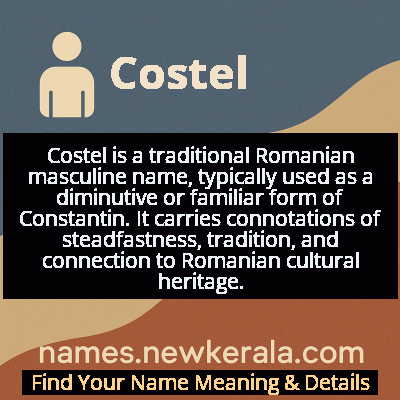Costel Name Meaning & Details
Origin, Popularity, Numerology Analysis & Name Meaning of Costel
Discover the origin, meaning, and cultural significance of the name COSTEL. Delve into its historical roots and explore the lasting impact it has had on communities and traditions.
Name
Costel
Gender
Male
Origin
Romanian
Lucky Number
2
Meaning of the Name - Costel
Costel is a traditional Romanian masculine name, typically used as a diminutive or familiar form of Constantin. It carries connotations of steadfastness, tradition, and connection to Romanian cultural heritage.
Costel - Complete Numerology Analysis
Your Numerology Number
Based on Pythagorean Numerology System
Ruling Planet
Moon
Positive Nature
Diplomatic, friendly, artistic, empathetic.
Negative Traits
Over-sensitive, moody, indecisive, prone to self-pity.
Lucky Colours
Green, cream, white.
Lucky Days
Monday.
Lucky Stones
Pearl, moonstone.
Harmony Numbers
1, 3, 4.
Best Suited Professions
Diplomats, mediators, caregivers, artists.
What People Like About You
Cooperative spirit, friendliness, artistic talent.
Famous People Named Costel
Costel Pantilimon
Professional Footballer
Romanian national team goalkeeper who played for English clubs including Sunderland and Nottingham Forest
Costel Câmpeanu
Politician
Romanian politician who served as Minister of Education and played key roles in post-communist educational reforms
Costel Busuioc
Opera Singer
Internationally acclaimed Romanian tenor who has performed in major opera houses across Europe
Costel Alexe
Politician
Romanian politician who served as Minister of Environment and coordinated important environmental protection initiatives
Name Variations & International Equivalents
Click on blue names to explore their detailed meanings. Gray names with will be available soon.
Cultural & Historical Significance
Extended Personality Analysis
The name Costel typically evokes associations with reliability, traditional values, and quiet strength. Individuals bearing this name are often perceived as grounded and practical, with a strong sense of duty and commitment to family and community. They tend to be methodical in their approach to life, preferring stability and consistency over rapid change or unpredictability. This steadfast nature makes them excellent long-term partners and loyal friends who can be relied upon during difficult times. Many Costels are seen as possessing an inner resilience that enables them to endure challenges without losing their core identity or values. They often exhibit a blend of traditional wisdom and practical problem-solving skills, making them valuable advisors and community leaders. While sometimes perceived as conservative or resistant to change, this quality often stems from a deep respect for proven methods and established traditions rather than mere stubbornness. Their combination of loyalty, practicality, and endurance makes them pillars of stability in both personal and professional contexts.
Modern Usage & Popularity
In contemporary Romania, Costel has transitioned from a popular given name to one that carries nostalgic and traditional connotations. While it has become less common among newborns since the 1990s, it remains well-represented in middle-aged and older demographics, particularly in rural areas and among families with strong traditional values. Urban parents now often prefer the more formal Constantin or modern alternatives, viewing Costel as somewhat dated. However, the name maintains cultural relevance through its appearance in media, literature, and as a common name for characters representing traditional Romanian values. Recent naming statistics show a slight resurgence in traditional names, including Costel, among families seeking to reconnect with cultural heritage, though it remains far from its mid-20th century popularity peak. The name's current usage reflects broader societal trends where traditional names are often reserved for honoring grandparents or expressing cultural pride rather than being first-choice options for new parents.
Symbolic & Spiritual Meanings
Symbolically, Costel represents the enduring qualities of tradition, resilience, and cultural continuity. The name embodies the concept of remaining constant and true to one's origins despite external pressures or changing circumstances. It symbolizes the importance of maintaining connections to family heritage and cultural roots in an increasingly globalized world. Metaphorically, Costel suggests the steady flow of a river—consistent, life-giving, and shaped by the landscape through which it passes, yet ultimately maintaining its essential character. The name also carries connotations of reliability and trustworthiness, representing individuals who serve as stable foundations in their relationships and communities. In a broader cultural context, Costel symbolizes Romania's ability to preserve its unique identity and traditions through centuries of historical challenges and transformations. It represents the quiet strength of ordinary people who maintain cultural continuity through their daily lives and values.

